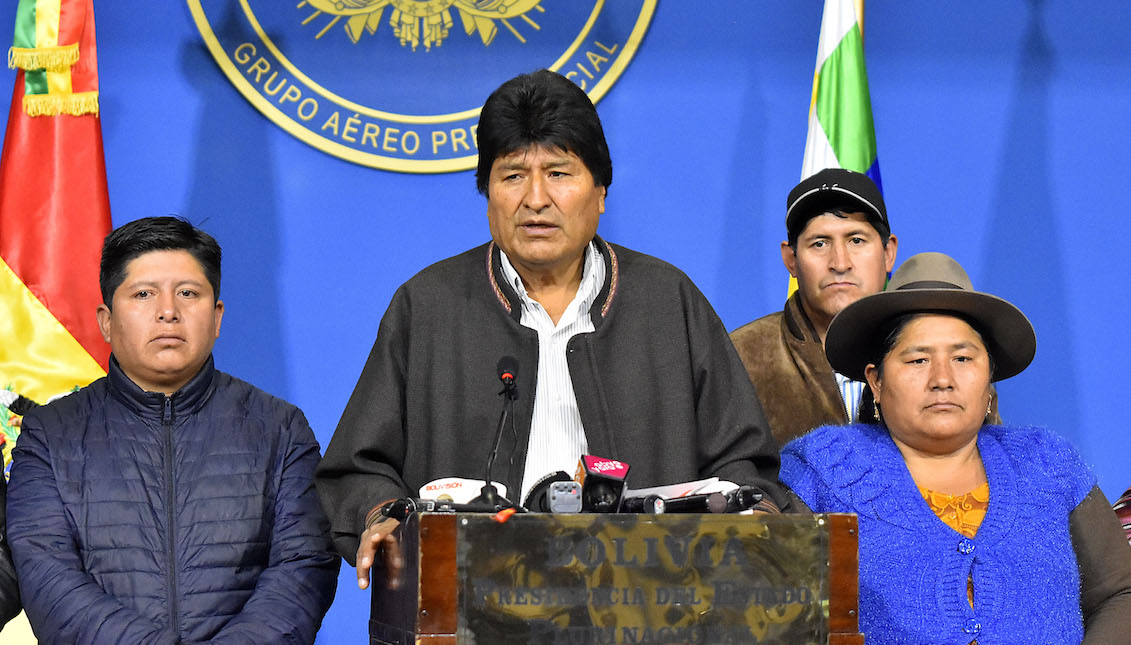
Bolivia's President Evo Morales resigns after mass demonstrations
The resignation of Evo Morales in Bolivia is the last consequence of the social unrest in Latin America.
Nothing explains the heterogeneity of Latin American identity more than the last months of mass protests across the continent.
While Venezuela is sinking more and more in misery thanks to the failure of the political leaders of both sides, Chile is experiencing one of the most serious social crises of the last decades due to the fatigue of the people before the economic policies inherited from Augusto Pinochet’s dictatorship.
Argentina once again embraced Peronism, and Brazil lives a deep political reform of the extreme right under the command of Jair Bolsonaro.
Also, in Ecuador, the people rejected the economic measures of President Lenin Moreno during the month of October, while Peruvians took to the streets after the decision of President Martín Vizcarra to dissolve the Congress.
In short, all Latin America seems to be going through a difficult period of a political and idiosyncratic transformation.
The last example of this was the resignation of the president of Bolivia Evo Morales last Sunday, after violent demonstrations unleashed by the alleged electoral fraud carried out by Morales to remain in power.
Social mobilizations took much of the country on the night of October 20 after the results of a quick count of votes during the presidential elections.
The opposition candidate Carlos Mesa led the rallies in front of the ex-Radisson hotel in La Paz where the count was being made and remarked the lack of separation of powers in the country.
The narrow victory of Morales announced that the president would perpetuate his position in the office, a seat he had held for more than 10 years.
Bolivians in all corners of the country took to the streets to denounce the fraud, demand an impartial recount of the votes and the resignation of the members of the Plurinational Electoral Body.
Between demonstrations, riots, strikes and even a labor stoppage, citizens shouted for the change of policy in the country.
The destabilization reached the point that members of the European Union and the Organization of American States (OAS) requested a second round of elections.
On Sunday, November 10, Evo Morales finally announced his resignation through a televised message from the Tropic of Cochabamba, "the stronghold of the coca growers unions of which he remains the top leader," the BBC explained.
While justifying his resignation to "prevent violence in the country from continuing," Morales also said he was the victim of "a political and police civic coup."
"My sin is to be indigenous, union leader and coca grower," he said.
RELATED CONTENT
However, his decision was determined by the request of the commander of the Armed Forces, General Williams Kaliman, who demanded his resignation to resolve the political crisis.
Similarly, and after the audit of the votes and the server that hosted the data, a report by the OAS determined that “given the accumulation of irregularities observed, it is not possible to guarantee the integrity of the data and give certainty of the results.”
Morales's resignation marks the end of the era of socialist revolutions in Latin America, triggered by the regime of Hugo Chávez Frías in Venezuela in 1999.
For her part, Democratic Representative Ilhan Omar denounced a "coup d'etat" in Bolivia, adding that the United States "must unequivocally oppose political violence in Bolivia. Bolivians deserve free and fair elections. ”
There's a word for the President of a country being pushed out by the military. It’s called a coup.
— Ilhan Omar (@IlhanMN) November 11, 2019
We must unequivocally oppose political violence in Bolivia. Bolivians deserve free and fair elections.
The elected Vice President of Argentina Cristina Kirchner, also said "there was a coup d'etat” in Bolivia, while other leftist leaders such as Andrés Manuel López Obrador (AMLO) described Morales's decision as "responsible."
Desde Bacalar, Quintana Roo, México hasta Bolivia. pic.twitter.com/0aiMgxYUnZ
— Andrés Manuel (@lopezobrador_) November 10, 2019
"There are always attitudes, authoritarian efforts, wanting to resolve things with confrontation and violence. The best method to resolve differences is the democratic method," added AMLO.
But the situation doesn’t seem to have calmed down with Morales's resignation.
The residence of the now-former president and members close to his government were subject to looting, assaults and fires on Sunday night, and the mayor of La Paz denounced public transport fires in the capital.
Denunciamos que grupos organizados por diputados y candidatos del MAS por la zona sur y El Alto están asaltando las estaciones de @LaPazBUS, del Hospital La Portada y amenazando las casas de las autoridades municipales. Estamos presentando las denuncias penales respectivas. https://t.co/Yvx2NGtjkF
— Luis Revilla Herrero (@LuisRevillaH) November 11, 2019
Apparently, the return to democracy will not be so simple, especially after 14 years of socialist revolution.











LEAVE A COMMENT:
Join the discussion! Leave a comment.